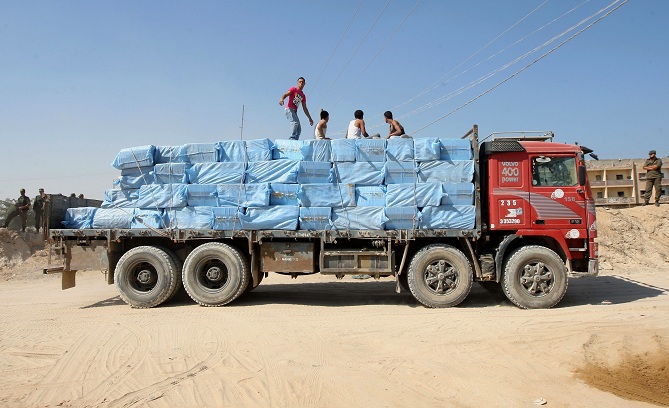An historic event took place in New Delhi, Feb. 5-7, 2007, when a delegation of senior rabbis from Israel and other countries met top Hindu leaders for the first time to discuss a range of subjects including the relevance of tradition in everyday life, similarities and dissimilarities between the two religions and the promotion of education.
They affirmed their shared values, condemned violence, and pledged to address the challenges of poverty and illness.
At the same time a rare and significant meeting took place between the Jewish delegation, which included the Ashkenazi Chief Rabbi of Israel, Yona Metzger, and senior members of India s Islamic community led by the President of the All India Organization of Imams of Mosques, Moulana Jameel Ahmed Ilyasi.
The Hindu/Jewish summit set the tone for interfaith collaboration. The Protocol of Cooperation – a declaration signed by Rabbi Yona Metzger and Swami Dayananda Saraswati, the convener of The Hindu Dharma Acharya Sabha – primarily acknowledges the shared values of two of the oldest religions in the world which both believe in the one Supreme Being who is the ultimate source of reality and creation, and condemns all forms of religious violence. The summit agreed to constitute a standing committee on Hindu-Jewish relations.
Swami Dayananda Saraswati noted the declaration will serve as a benchmark for others to follow and emulate, resulting in a better environment for all. I have always believed in peace-full co-existence. All religious traditions should respect common values and insist on compassion. Religious leaders bear the responsibility of leading their followers to a path of peace so that the world will become a safer place to live.
Lauding the efforts of The World Council of Religious Leaders (WCORL) who organized this summit, Chief Rabbi Yona Metzger said though religious dialogues have increased recently, the Hindu-Jewish declaration is a significant move that highlights the necessity of expanding interfaith community.
For thousands of years we have marched on parallel causes and have now built bridges of cooperation between the two religions. Jews have lived in India for over 2000 years and have never been discriminated against. This is something unparalleled in human history .
The Jewish delegation included Rabbi David Rosen, former Chief Rabbi of Ireland and President of IJCIC, the International Jewish Committee that represents World Jewry in its relations with other world Religions, Oded Weiner, the director general of The Chief Rabbinate of Israel and over 10 International Jewish leaders. The Hindu participants included over 30 prominent heads of Hindu traditions from all over India.
The summit provided the framework for Jewish and Muslim leaders to meet and discuss the significant role religion could play in promoting peace in the Middle East. On Palestine, Metzger lamented that his community had dialogue only with moderate Muslim leaders with little power and influence. So far efforts to engage other sections who command power have proved futile. But that doesn t mean we will end our efforts .
The Muslim/Jewish dialogue that took place ended in a joint statement, parts of which are quoted below:
Muslims and Jews share tradition and legacy. We are bound by history, civilization culture and common values. From Adam to Moses there is everything that unites us and even thereafter Islam, through Quranic injunctions, calls upon Muslims to treat Jews as Ah-e-Kitab and as a God fearing people.
Similarly Judaism views Muslims as believers in God and requires that they be treated with full dignity. While relations with Jews and Muslims have been influenced regularly in recent years by political factors, we have a long history of good and healthy relations between us.
We declare that it is high time for the religious leaders of both sides to engage in dialogue and use their collective influence to stop the bloodshed of innocent civilians. We condemn killing, reject extremism and the misuse of religion for acts of violence. Suicide is a forbidden act in Islam and in Judaism.
We pledge ourselves to work together to promote the sanctity of life and to advance justice and peace .
In light of the continuing and bitter Arab-Israeli conflict, which, although about land, is inextricably bound up with the religious identities of the people concerned, Indian Muslim leaders can play a unique role in bridging this divide. I believe it is incumbent upon the international community to engage them and, through the WCORL, I am committed to harnessing religious resources in efforts to propagate global harmony and peace.
Bawa Jainis Secretary-General of The Millennium World Peace Summit of Religious and Spiritual Leaders and of The World Council of Religious Leaders (WCORL). This article is distributed by the Common Ground News Service (CGNews) and can be accessed at www.commongroundnews.org.

